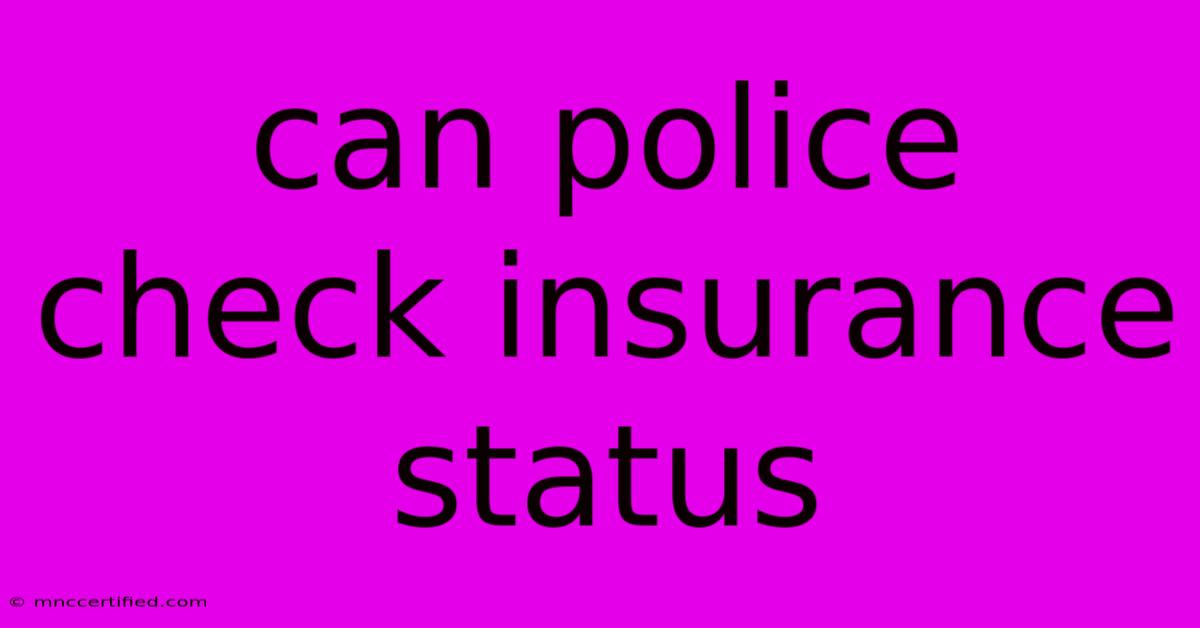Can Police Check Insurance Status

Table of Contents
Can Police Check Insurance Status? A Comprehensive Guide
The question of whether police can check your insurance status is a common one, sparking anxieties for drivers everywhere. The answer, however, isn't a simple yes or no. It depends significantly on location, the specific circumstances, and the type of interaction you have with law enforcement. This comprehensive guide will delve into the intricacies of police insurance checks, clarifying the legal landscape and offering helpful advice.
How Police Can Check Your Insurance Status
In many jurisdictions, police officers possess several avenues for verifying insurance coverage:
1. During Traffic Stops: The Immediate Check
During a routine traffic stop, particularly if another violation is observed, an officer might ask for your driver's license, vehicle registration, and proof of insurance. This is a direct, immediate check. If you cannot provide proof of insurance, you are likely to face consequences. The severity of these consequences varies by state and the specific circumstances.
2. Access to State Databases: Behind-the-Scenes Verification
Many states maintain databases linking driver's licenses and vehicle registrations to insurance information. Officers may access these databases, often through in-car computer systems, to instantly verify your coverage. This allows for a quicker determination of insurance status, even without you directly presenting proof of insurance. However, access to these databases and their capabilities vary significantly by state.
3. Post-Accident Investigations: The Deeper Dive
Following a car accident, police investigations may involve more thorough checks of insurance status. This is especially true if injuries or significant property damage are involved. Insurance information is crucial for processing claims and determining liability. In these situations, police may actively seek out insurance verification even if it wasn't readily available at the scene.
Variations in State Laws: A Patchwork of Regulations
The legal framework surrounding police access to insurance information differs considerably between states. Some states have strong laws mandating insurance and providing robust mechanisms for police verification. Others may have less stringent requirements or rely more heavily on drivers presenting proof of insurance directly. Researching your specific state's laws is crucial for understanding your rights and obligations.
Understanding Your State's Requirements: Key Considerations
- Mandatory Insurance Laws: Most states have mandatory insurance laws, but the specifics vary. Understanding your state's minimum coverage requirements is essential.
- Penalties for Uninsured Driving: The penalties for driving without insurance vary drastically – from fines and license suspensions to mandatory vehicle impoundment. These penalties can be substantial and significantly impact your driving record.
- State Databases and Police Access: Familiarize yourself with your state's database systems and the extent to which law enforcement can access them to verify insurance information.
What Happens if You Don't Have Insurance?
Driving without insurance is a serious offense. The consequences can include:
- Fines: Substantial fines are a common penalty.
- License Suspension or Revocation: Your driving privileges could be suspended or revoked.
- Vehicle Impoundment: Your vehicle might be impounded until proof of insurance is provided.
- Increased Insurance Premiums: Even after resolving the immediate penalties, you'll likely face significantly higher insurance premiums in the future.
- Points on your driving record: These points can impact your ability to obtain insurance or renew your license.
Protecting Yourself: Proactive Measures
The best way to avoid problems with police insurance checks is to always maintain valid car insurance. Here are some proactive steps:
- Keep Your Proof of Insurance Up-to-Date: Carry a copy of your insurance card in your vehicle at all times.
- Regularly Review Your Policy: Ensure your coverage remains adequate and that your information is accurate.
- Understand Your State's Laws: Familiarize yourself with the specifics of your state's insurance requirements and penalties for non-compliance.
- Maintain a Clean Driving Record: This can significantly impact your insurance rates and your overall ability to obtain coverage.
In conclusion, while the specifics vary, police do have methods to check your insurance status. Maintaining valid insurance is crucial to avoid potential penalties and complications. Staying informed about your state's laws and proactively managing your insurance coverage are the best ways to protect yourself.

Thank you for visiting our website wich cover about Can Police Check Insurance Status. We hope the information provided has been useful to you. Feel free to contact us if you have any questions or need further assistance. See you next time and dont miss to bookmark.
Featured Posts
-
Heartbroken Wilmington Theaters Sudden Loss
Nov 19, 2024
-
Paul Teal One Tree Hill Star Dies At 35
Nov 19, 2024
-
Great Lakes Independent Insurance
Nov 19, 2024
-
Stairs And Buckets Life Insurance
Nov 19, 2024
-
Castle Insurance Connection Guide
Nov 19, 2024